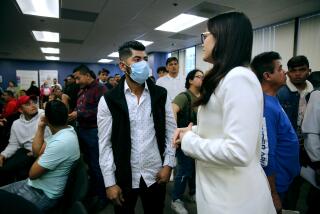Quasi-Diplomatic Corps Is 21 Strong : Honorary Consuls in San Diego Work Long Hours Without Pay
Every time E.H. (Gene) Sapper pulls into a gas station, he ends up giving a civics lesson to the attendant.
That’s because Sapper, a San Diego contractor who has been the honorary consul to Guatemala since 1974, drives a car bearing official-looking, state-issued “honorary consul” license plates.
“I end up getting called ‘counselor’ an awful lot,” quipped Sapper, a Guatemalan-born, naturalized U.S. citizen who serves as one of San Diego’s 21 honorary consuls.
However, gas station attendants aren’t the only ones confused about what the nation’s estimated 1,100 honorary consuls do.
“I doubt that more than 1% of San Diegans know that San Diego has a consul corps, and I’m probably being charitable with the 1% figure,” suggested another businessman-turned-honorary consul, who diplomatically asked that his name not be used.
Explaining that “what a consul does is already complicated enough,” Hermann Zillgens, a San Diego architect who has served as honorary consul for the Federal Republic of Germany since 1983, said, “Putting the adjective in front of consul produces an even higher level of misunderstandings.”
Honorary consuls--who are often mistaken for full-time consuls, ambassadors or diplomats--are usually American citizens who, for free, handle consular functions in cities where a “career” consul would be prohibitively expensive.
“You could say we’re semi-diplomatic,” quipped Zillgens, who recently was named president of San Diego’s 21-member consular corps. “We don’t get paid but we do just about everything that a diplomat does.”
Even the U.S. State Department has admitted to some confusion about the role of honorary consuls. That’s because the department, charged with accrediting foreign consuls, can only guess at the number of honorary consuls at work in the United States, according to Ron Mlotek, chief counsel with the State Department’s Office of Foreign Missions.
The role of an honorary consul is often misunderstood because Americans usually don’t understand consular protocol, suggested Cami E. Gonas, Finland’s honorary consul in Miami. Gonas, who made consular protocol the basis of her post-graduate thesis, also wrote a chapter on consular protocol for Florida’s official protocol handbook, and has been “sitting on a book” about consular and diplomatic protocol.
Too often, Americans fail to recognize that “honorary consuls are not (full-time) diplomats,” Gonas said. Rather, honorary consuls “often lead a double life in private business as a lawyer or travel agent . . . as well as in their official function as a consul,” Gonas said.
“Invariably you’re stepping on someone’s toes unless you’re aware of the rules,” said Gonas, who added that well-intentioned but misinformed people “never seem to know what to do with (consuls). It’s highly embarrassing if they introduce me as consul when I’m (attending a function) because of my other profession (He’s a lawyer.). And it gets worse if other consuls who are there don’t get introduced.
Members of San Diego’s consular corps approach their work in differing ways.
“Some people work for charity but (I) work for a country and I get a real kick out of it,” Sapper said. “I still have very fond, close ties to Guatemala and this is an opportunity for me to do something, to give something back, and to keep in touch with relatives.”
Although most honorary consuls have maintained links to the country for which they serve as consul, the role has become something of a family affair for George L. Gildred and W. Daniel Larsen.
Gildred, president of a family-owned land development company, has been the honorary Chilean consul in San Diego since 1976. He “inherited” the job from his father, Philip Louis Gildred, who served as the honorary Chilean consul from 1944 until his death in 1974.
“For years my father carried a lunch pail to school (in Santiago, Chile) with a little playmate, Rios, who ended up as president of Chile,” said Gildred. Philip Gildred moved to San Diego in the late 1920s, and the schoolmates kept in touch by mail.
Interestingly, the elder Gildred’s move to San Diego was accidental: after surviving a bout with yellow fever, Philip Gildred decided to move to New York, George Gildred said, “But when he arrived in Panama, he’d missed his steamer and learned that there wasn’t another one for 12 days.”
Rather than wait, Gildred boarded a Pacific-bound steamer that stopped at what the steamship agent called “a wonderful resort called Hotel del Coronado,” George Gildred said. “My father fell in love with San Diego and stayed here. He never did take the train to New York.”
Larsen, a contractor and Port District commissioner who has served as the Danish honorary consul since 1964, also inherited the position from his father, Ben O. Larsen, who was an honorary consul from 1950 until his death in 1963.
Although honorary consuls aren’t full-time representatives for their chosen countries, the time drain nonetheless can be considerable.
“I spend two to three hours a day, much of it on the telephone,” on consular work, said Ray Lubach, owner of Lubach’s Restaurant and, since 1958, honorary consul to his native Netherlands. “I hold (consul) hours from 9 a.m. to 11 a.m.”
Although much of an honorary consul’s work is routine--for example, issuing “life certificates” that foreign nationals must present to claim their government pensions, or acting as tourist guides for their respective countries--national and international events have presented special challenges.
During the 1984 Olympics in Los Angeles, San Diego police and county sheriffs pieced together what honorary consuls described as a fairly elaborate scheme to protect consuls and foreign nationals in California for the Games from foul play.
“We had pretty close relationships with (Sheriff) John Duffy and (San Diego Chief of Police) Bill Kolender,” Sapper said. “(They) did a hell of a job preparing for any eventuality.”
When an earthquake rocked Guatemala in 1976, Sapper was pressed into service as the leader of a fund-raising effort that generated $6,000 for the earthquake victims.
Political turmoil also has boosted the workload for honorary consuls from some Latin and South American countries. Although they lack any diplomatic authority, San Diego’s honorary consuls are often called upon when illegal aliens from their respective countries are apprehended in the United States.
“The majority of our work has to do with illegal Guatemalans who have for some reason or another gotten in trouble, be it in jail or the hospitals,” said Sapper. “These people are not criminals. They’re here to try and better themselves.”
Recently, Sapper enlisted state labor standards officials to force a North County rancher to turn over more than $6,000 in back wages to a pair of impoverished Guatemalan Indians who were in this country illegally.
Local authorities turn to honorary consuls for assistance because they are known as “businessmen who don’t want red tape to get in the way,” Zillgens said. “They can talk person-to-person with us and that’s the immediate great benefit for them. They know we don’t want things to get out of hand.”
“There is no manual for this job, but 90% of it is common sense,” said Lubach, who, along with other honorary consuls, has answered telephone calls in the middle of the night from foreign nationals in trouble with U.S. authorities, or from hospitals that have admitted foreigners hurt in accidents.
Consuls also may be drawn into the personal affairs of their nationals.
“We’ve had cases where, say, a private boat (has employed) a Honduran woman as a maid, and the maid calls me because the boat owner has beaten her or is an alcoholic,” said Ella Isabel Flores, who has been the honorary consul for Honduras since 1966. “I’ve been called by people who say they are pregnant and have no money, from someone who comes here undocumented and says, ‘Please help me, I don’t know what to do.’
“Occasionally, I’ve given people $20 of my own money but the consulate has no funds” for that kind of charity, said Flores, a member of the City of San Diego’s Planning Department who two years ago married Jean-Pierre Paris, a travel agent who serves as honorary consul for France. “You run into all these kinds of very human things.”
Honorary consuls also help their adopted countries bolster trade relations with the United States, said Flores, who has helped San Diego business people find Honduran sources for everything from sesame seeds to sharkskins.
“San Diego is the eighth- or ninth-largest city, it’s a border city, and it has good industry, especially the high-tech industry that many people from the Federal Republic of Germany are interested in,” Zillgens said. “An important part of this job involves (directing Germans) toward investment opportunities and trade opportunities in San Diego.”
San Diego’s consular corps regularly invites Tijuana’s 14-member consular corps to its meetings, making it “the only consular corps to our knowledge in the world that meets across an international border,” according to Gildred.
More to Read
Sign up for Essential California
The most important California stories and recommendations in your inbox every morning.
You may occasionally receive promotional content from the Los Angeles Times.










